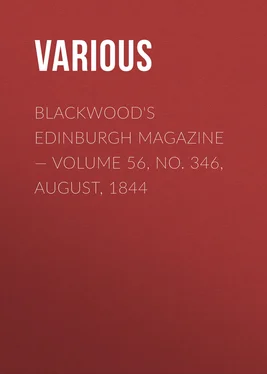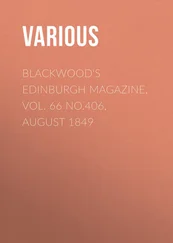Various - Blackwood's Edinburgh Magazine — Volume 56, No. 346, August, 1844
Здесь есть возможность читать онлайн «Various - Blackwood's Edinburgh Magazine — Volume 56, No. 346, August, 1844» — ознакомительный отрывок электронной книги совершенно бесплатно, а после прочтения отрывка купить полную версию. В некоторых случаях можно слушать аудио, скачать через торрент в формате fb2 и присутствует краткое содержание. Издательство: Иностранный паблик, Жанр: foreign_antique, periodic, foreign_edu, на английском языке. Описание произведения, (предисловие) а так же отзывы посетителей доступны на портале библиотеки ЛибКат.
- Название:Blackwood's Edinburgh Magazine — Volume 56, No. 346, August, 1844
- Автор:
- Издательство:Иностранный паблик
- Жанр:
- Год:неизвестен
- ISBN:нет данных
- Рейтинг книги:5 / 5. Голосов: 1
-
Избранное:Добавить в избранное
- Отзывы:
-
Ваша оценка:
- 100
- 1
- 2
- 3
- 4
- 5
Blackwood's Edinburgh Magazine — Volume 56, No. 346, August, 1844: краткое содержание, описание и аннотация
Предлагаем к чтению аннотацию, описание, краткое содержание или предисловие (зависит от того, что написал сам автор книги «Blackwood's Edinburgh Magazine — Volume 56, No. 346, August, 1844»). Если вы не нашли необходимую информацию о книге — напишите в комментариях, мы постараемся отыскать её.
Blackwood's Edinburgh Magazine — Volume 56, No. 346, August, 1844 — читать онлайн ознакомительный отрывок
Ниже представлен текст книги, разбитый по страницам. Система сохранения места последней прочитанной страницы, позволяет с удобством читать онлайн бесплатно книгу «Blackwood's Edinburgh Magazine — Volume 56, No. 346, August, 1844», без необходимости каждый раз заново искать на чём Вы остановились. Поставьте закладку, и сможете в любой момент перейти на страницу, на которой закончили чтение.
Интервал:
Закладка:
"THE SICK CHILD
"He shall give his angels charge over thee, to keep thee in all thy ways."—PSALM xci.
"In a chamber, faintly crying,
With its mother o'er it sighing,
Lay a baby pale and wan;
Ever turning—restless turning—
Much she dreaded fever burning,
Sickness slow or sickness hasting,
Cough, convulsion, ague wasting.
Bitter tears there fell upon
The pale face of her little son.
"The evening chimes had ceased their ringing,
And the even song was singing
In the old kirk grey with years;
Through the air sweet words came welling—
Words of peace, unto that dwelling;
Hymns they sang, how angels shielded
Those who ne'er to sin had yielded:—
And her pale face lost its fears—
That lonely mother dried her tears.
"In her arms the babe soon slumber'd;
That little son, whose days seem'd number'd,
Smiled upon his mother sleeping.
The Lord indeed had sorely tried her,
But his angel knelt beside her;
Heavenly breezes cool'd the fever
Of her child—He shall not leave her!
And this mother ceased her weeping."
The "Expected Return" is quite in Redgrave's best manner
"Fancy, impatient of all painful thoughts,
Pictured the bliss should welcome his return;
* * * * *
And hope and memory made a mingled joy."—SOUTHEY
This is a lovely figure; a loving and lovable gentle creature! and many such have we seen by Redgrave's hand. Not Raffaelle himself could more truly paint the pure mind—that precious jewel, innocence, in its most lovely casket.
Severn has two plates, which may be called companions; racy and good are they, and of one vintage. We are not quite satisfied with either face or figure of the maiden in the "Roman Vintage." Hers is not a face of feeling; nay, we would almost beg Mr Severn's pardon, and pronounce her a bit of a fool. The "Neapolitan" is much better. They are executed in a very bold, broad, free style of etching, and effective. Horsley's "English Peasant" might be allowed to be a little weatherbeaten; but, at first sight, we should say that he was not of the temperance society when the aquafortis was on the table. It is black, from being overbitten. Yet, after a while, we see through the darkness into the character. He is an honest fellow, but a little "disguised." His "Twilight" is very good, yet perhaps is the light a little too sharp and strong for that hour. The subject is from verses by Redgrave, and good and quaintlike old gentle rhymes they are. But how comes it that the figures are both feminine?—that does not accord with the lines.
"Time was no more for them: the sun had gone,
The stars from sunset glow began to peer;
Yet 'neath those stars that pair still linger'd on,
Unconscious of the night, fast drawing near!
His voice to her was daylight, and her smile
A sunny morning breaking o'er his soul:
Such hours of bliss come only once—the while
Long-silent love speaks forth without control,
And of its hopes and fears first telleth out the whole."
"Welsh Gossips."—
"At every word a reputation dies."
For the credit of Wales, we hope Mr Horsley did not sketch these from nature; yet is there a fearful look of natural acrimony in the one, and sheer busybodyism in the other. The plate is beautifully etched. His "Moonlight" is not quite clear enough—there are too many sparkling lights. The "Shady Seat" is prettily designed; the lady looks rather too alarmed, and, for the subject, perhaps there is not enough of shadow— certainly not "enough for two." We at once recognize Stonhouse in the "Evening effects of Solitude," and his "Neath Abbey." The former he thus describes:—
"There, woods impervious to the breeze,
Thick phalanx of embodied trees—
Here, stillness, height, and solemn shade
Invite, and contemplation aid."
We are sure that Neath Abbey is from nature, for it has the sooty and smoked character of that manufacture-ruined ruin. But we must not pass by his "Dorothea" from Don Quixote. Nothing can be more happily expressed than the deep shady retirement of the wood; there are nice gradations of shades, which is the very character of retirement, and Dorothea is herself in it, not a bright figure in a black mass—and good is the figure too, but the feet are unfinished.
Mr Creswick is a large contributor, and least fortunate in his first: it is not the scene so well given in verse by his friend Townsend; for it is too pretty, too tight. It wants the "lane;" it is the road-side.
"THE WAYSIDE
"A lane, retired from noisy haunts of men,
Whose ruts the solitary lime cart tracks,
Whose hedge-sides, propp'd by many a mossy stone,
Are checker'd o'er with foxglove's purple bloom,
Or graceful fern, or snakehood's curling sheath,
Or the wild strawberry's crimson peeping through.
There, where it joins the far-outstretching heath,
A lengthen'd nook presents its glassy slope,
A couch with nature's velvet verdure clad,
Trimm'd by the straggling sheep, and ever spread
To rest the weary wanderer on his way.
There, oft the ashes of the camp-fire lie,
Marking the gipsy's chosen place of rest.
Black roots of half-charr'd furze, and capons' bones—
Relic of spoils from distant farmers' coop—
Point to the revels of preceding night.
And fancy pictures forth the swarthy group,
Their dark eyes flashing in the ruddy glare;
While laughter, louder after long constraint,
From every jocund face is pealing round.
His "Summer" is a simple unaffected scene, such as may be met with any where, if you have but "eyes to see:" and pretty much like it, but inferior—for if it be not more common in subject, it is in treatment— is the "Old Farm-House," from that delighting and most natural painter with her pen, Miss Mitford. Very exquisite in his "Moonlight"—so true, with all the quivering and blending light of nature, where all things are at once lucid and in shade—as Virgil happily expresses it, "luce sub incertâ linae." Sweet, too, and in the deep solemn repose of religious eve, is the "Village Church"—from lines by Rogers. He is not so happy in his "Smithy;" neither is the scene of interest nor the effect pleasing. But he makes up for all by his "Outward Bound." The home is left in the calmest, stillest of days; though the "outward bound" has sails, they rather wait for, than feel, the wind; there is the village church still in view, and will yet be an hour and more. The sky is, though really printers' ink, like many a sooty vapour converted into light-shedding yet faint clouds—we can see the colour—it is a grey, in which is gold and ultra-marine. The boat is conveying the "outward bound" to the vessel; there is the moving and the waiting. It is poetical. "The Castle" we do not much admire; it is a villa castle, and on no agreeable river. "Low Water" is quite another thing; it is a beautiful etching. He thus describes it with his pen—
"The flowing tides that spread the land,
And turn to sea again."
The "River Scene," illustrating lines from Southey, is delicately touched, and a pleasing scene; yet we feel sure it is not from nature. Why, we can hardly tell. Is it that there is a bridge, apparently without a bank on one side to rest upon? "The Terrace," from lines by Andrew Marvel, is a most fascinating upright plate. It is perfectly true, giving all the thousand intricacies and shades of such a scene; and there is grace in the forms, and the figures well suit the whole. All is gentleness and ease; not a light is too strong, or a shadow too deep; there is no violence—which too many are apt to express when they would give powerful effect. His "Fishing Scene on the Coast of Ireland" is not to our taste, yet is it not without meaning—it is windy and sunny. "The Oriental Palace" is solemn, with its ancient yew in the silence of the crescent moon; but the ruin is to fill up, and does no good.
Читать дальшеИнтервал:
Закладка:
Похожие книги на «Blackwood's Edinburgh Magazine — Volume 56, No. 346, August, 1844»
Представляем Вашему вниманию похожие книги на «Blackwood's Edinburgh Magazine — Volume 56, No. 346, August, 1844» списком для выбора. Мы отобрали схожую по названию и смыслу литературу в надежде предоставить читателям больше вариантов отыскать новые, интересные, ещё непрочитанные произведения.
Обсуждение, отзывы о книге «Blackwood's Edinburgh Magazine — Volume 56, No. 346, August, 1844» и просто собственные мнения читателей. Оставьте ваши комментарии, напишите, что Вы думаете о произведении, его смысле или главных героях. Укажите что конкретно понравилось, а что нет, и почему Вы так считаете.












